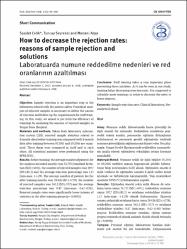How to decrease the rejection rates: reasons of sample rejection and solutions
Künye
Çelik, S., Seyrekel, T., Arpa, M. (2018). How to decrease the rejection rates: reasons of sample rejection and solutions. Türk Biyokimya Dergisi, 43(1), 98-100.Özet
Objective: Sample rejection is an important step in the laboratory related with the patient safety. Periodical analysis of rejected samples is necessary to define the causes of rejection and follow-up the requirements for staff training. In this study, we aimed to put forth the efficiency of trainings by analyzing the amount of rejected samples in Yozgat State Hospital. Materials and methods: Taken from laboratory information system (LIS), rejected sample statistics related to 8 month-data before training was compared with 8-month data after training between 07.2015 and 10.2016 are examined. These datas were compared in itself and to each other. All statistical analyses were performed using the SPSS (V15). Results: Before training, the average number of patients for the analysis included months was 34,733 [standard deviation (SD) ± 4031], the number of rejected samples was 397.7 (SD ± 85.3) and the average rejection percentage was 1.13 (min-max: 1–1.29). The average number of patients for the after training months was 39,426 (SD ± 4779), the number of rejected samples was 343.2 (SD ± 57.7) and the average rejection percentage was 0.87 (min-max: 0.62–0.98), Rejected sample rates were significantly lower interms of statistics in the after-training group (p = 0.0001). Conclusion: Staff training takes a very important place preventing these mistakes. As it can be seen in our study, training helps decreasing rejection rates. It is suggested to schedule more trainings in order to decrease the rates to lower degrees. Amaç: Numune reddi, laboratuarda hasta güvenliği ile ilgili önemli bir önlemdir. Reddedilen örneklerin periyodik olarak analizi, personelin eğitimin ihtiyaçlarını belirlenmesi ve personele gerekli eğitimlerin verilerek numune güvenliğinin sağlanmasına hizmet eder. Bu çalışmada, Yozgat Devlet Hastanesinde reddedilen numunelerin analiz ederek eğitimlerin etkinliğini ortaya koymayı amaçladık. Materyal-Metod: Numune reddi ile ilgili bilgiler 07,2015 ve 10,2016 tarihleri arasını kapsayacak şekilde Laboratuvar bilgi sisteminden (LIS) alındı. Eğitimden önceki 8 aylık verilerle ile eğitimden sonraki 8 aylık veriler kendi içlerinde ve birbirleriyle karşılaştırıldı. Tüm istatistiksel analizler SPSS (V15) kullanılarak yapıldı. Sonuçlar: Eğitimden önceki sekiz aylık dönem de ortalama hasta sayısı 34.733 (SD ± 4031), reddedilen numune sayısı 397,7 (SD ± 85,3) ve ortalama reddedilme yüzdesi 1,13 (min-max: 1–1,29) olarak bulunmuştur. Egzersiz sonrası aylardaki ortalama hasta sayısı 39.426 (SD ± 4779), reddedilen numune sayısı 343,2 (SD ± 57,7) ve ortalama reddedilme yüzdesi 0,87 (min-max: 0,62–0,98) bulunmuştur. Reddedilen numune oranları, eğitim sonrası grupta istatistiksel olarak anlamlı ölçüde düşük bulundu (p = 0,0001). Tartışma: Personel eğitimi, laboratuvar hataları önlemede çok önemli bir yer tutmaktadır. Çalışmamızda görülebileceği gibi, eğitim numune reddedilme oranlarının düşürülmesine yardımcı olmaktadır. Numune red oranları düşürmek için daha fazla ve iyi planlanmış eğitimlerin yapılması önerilmektedir.
Kaynak
Türk Biyokimya DergisiCilt
43Sayı
1Bağlantı
https://doi.org/10.1515/tjb-2017-0346https://app.trdizin.gov.tr/makale/TXpBNU1qSXpNdz09
https://hdl.handle.net/11436/5750


















